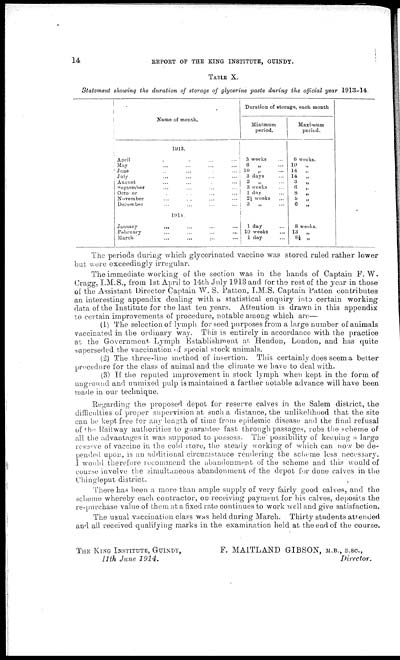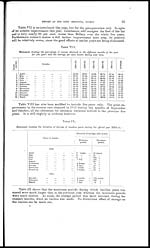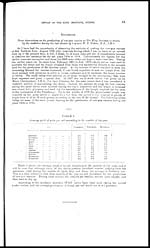Medicine - Vaccination > 1877-1929 - Report on vaccination in the Madras Presidency > Report on vaccination in Madras 1904-1921 > 1913-1914 - Annual report on the vaccination in the Madras Presidency and also on the work of the vaccine section of the King Institute of Preventive Medicine, Guindy for the year 1913-14
(148) Page 14
Download files
Individual page:
Thumbnail gallery: Grid view | List view

14 REPORT OF THE KING INSTITUTE,GUINDY.
TABLE X.
Statement showing the duration of storage of glycerine paste during the official year 1913-14.
|
Name of month. |
Duration of storage, each month |
|||
|
Minimum |
Maximum |
|||
|
1913. |
||||
|
April ... ... ... ... |
3 weeks ... |
6 weeks. |
||
|
May... ... ... ... |
6 „ ... |
10 „ |
||
|
June ... ... ... ... |
10„ |
14 „ |
||
|
July... ... ... ... |
3 days ... |
14 „ |
||
|
August ... ... ... ... |
2 „ |
3 „ |
||
|
September ... ... ... ... |
3 weeks ... |
6 „ |
||
|
Octomber ... ... ... ... |
1 day ... |
8 „ |
||
|
November ... ... ... |
2½ weeks ... |
5„ |
||
|
December ... ... ... ... |
3 „ |
6 „ |
||
|
1914. |
||||
|
January ... ... ... ... |
1 day |
8 weeks. |
||
|
February ... ... ... |
10 weeks |
13 „ |
||
|
March ... ... ... ... |
1 day |
8½ „ |
||
The periods during which glycerinated vaccine was stored ruled rather lower
but were exceedingly irregular.
The immediate working of the section was in the hands of Captain F. W.
Cragg, I.M.S., from 1st April to 14th July 1913 and for the rest of the year in those
of the Assistant Director Captain W. S. Patton, I.M.S. Captain Patton contributes
an interesting appendix dealing with a statistical enquiry into certain working
data of the Institute for the last ten years. Attention is drawn in this appendix
to certain improvements of procedure, notable among which are—
(1) The selection of lymph for seed purposes from a large number of animals
vaccinated in the ordinary way. This is entirely in accordance with the practice
at the Government Lymph Establishment at Hendon, London, and has quite
superseded the vaccination of special stock animals.
(2) The three-line method of insertion. This certainly does seem a better
procedure for the class of animal and the climate we have to deal with.
(3) If the reputed improvement in stock lymph when kept in the form of
unground and unmixed pulp is maintained a farther notable advance will have been
made in our technique.
Regarding the proposed depot for reserve calves in the Salem district, the
difficulties of proper supervision at such a distance, the unlikelihood that the site
can be kept free for any length of time from epidemic disease and the final refusal
of the Railway authorities to guarantee fast through passages, robs the scheme of
all the advantages it was supposed to possess. The possibility of keeping a large
reserve of vaccine in the cold store, the steady working of which can now be de-
pended upon, is an additional circumstance rendering the scheme less necessary.
I would therefore recommend the abandonment of the scheme and this would of
course involve the simultaneous abandonment of the depot for done calves in the
Chingleput district.
There has been a more than ample supply of very fairly good calves, and the
scheme whereby each contractor, on receiving payment for his calves, deposits the
re-purchase value of them at a fixed rate continues to work well and give satisfaction.
The usual vaccination class was held during March. Thirty students attended
and all received qualifying marks in the examination held at the end of the course.
THE KING INSTITUTE GUINDY, F. MAITLAND GIBSON, M.B., B.SC.,
11th June 1914. Director.
Set display mode to: Large image | Zoom image | Transcription
Images and transcriptions on this page, including medium image downloads, may be used under the Creative Commons Attribution 4.0 International Licence unless otherwise stated. ![]()
| Permanent URL | https://digital.nls.uk/91178307 |
|---|
| Attribution and copyright: |
|
|---|---|




